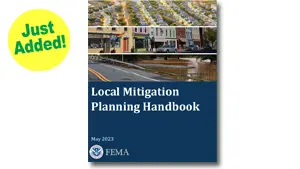
Local Mitigation Planning Handbook
FEMA’s Local Mitigation Planning Handbook (Handbook) guides local governments, including special districts, as they develop or update a hazard mitigation plan.

FEMA’s Local Mitigation Planning Handbook (Handbook) guides local governments, including special districts, as they develop or update a hazard mitigation plan.
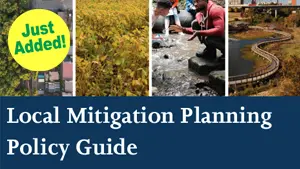
Local Mitigation Planning Policy Guide is FEMA’s official policy on and interpretation of the applicable statutes and mitigation planning regulations in 44 CFR Part 201. This policy applies to local governments that develop, update and implement local mitigation plans, as well as FEMA and state officials who review and approve those plans.
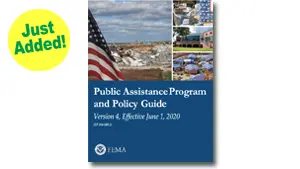
When an area has received a Presidential declaration of an emergency or major disaster, then its state, tribal, territorial and local governments — and certain types of private non-profits — may be eligible to apply for Public Assistance (PA).
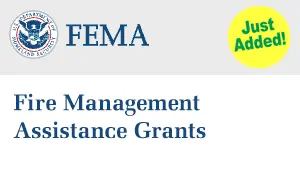
Fire Management Assistance Grant (FMAG) Program is available to states, local and tribal governments, for the mitigation, management, and control of fires on publicly or privately owned forests or grasslands, which threaten such destruction as would constitute a major disaster.
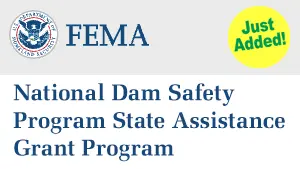
The National Dam Safety Program (NDSP) State Assistance Grant Awards provide assistance to encourage the establishment and maintenance of effective State programs intended to ensure dam safety, to protect human life and property, and to improve State dam safety programs.
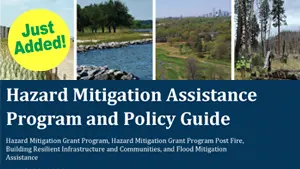
FEMA’s Hazard Mitigation Grant Program provides funding to state, local, tribal and territorial governments so they can develop hazard mitigation plans and rebuild in a way that reduces, or mitigates, future disaster losses in their communities.
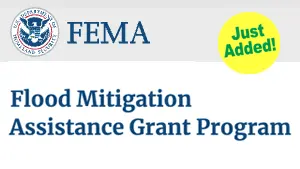
The Flood Mitigation Assistance grant program is a competitive program that provides funding to states, federally recognized Tribal governments, U.S. territories, and local governments.
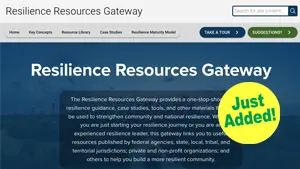
The Resilience Resources Gateway provides a one-stop-shop for resilience guidance, case studies, tools, and other materials that can be used to strengthen community and national resilience.
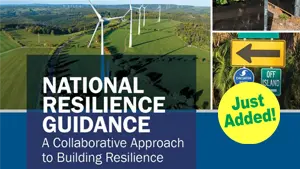
FEMA’s National Resilience Guidance focuses on actionable principles to create a more resilient nation from identifying threats to working collaboratively towards sustainable solutions.

FEMA’s Local Mitigation Planning Handbook (Handbook) guides local governments, including special districts, as they develop or update a hazard mitigation plan.

Local Mitigation Planning Policy Guide is FEMA’s official policy on and interpretation of the applicable statutes and mitigation planning regulations in 44 CFR Part 201. This policy applies to local governments that develop, update and implement local mitigation plans, as well as FEMA and state officials who review and approve those plans.

When an area has received a Presidential declaration of an emergency or major disaster, then its state, tribal, territorial and local governments — and certain types of private non-profits — may be eligible to apply for Public Assistance (PA).

Fire Management Assistance Grant (FMAG) Program is available to states, local and tribal governments, for the mitigation, management, and control of fires on publicly or privately owned forests or grasslands, which threaten such destruction as would constitute a major disaster.

The National Dam Safety Program (NDSP) State Assistance Grant Awards provide assistance to encourage the establishment and maintenance of effective State programs intended to ensure dam safety, to protect human life and property, and to improve State dam safety programs.

FEMA’s Hazard Mitigation Grant Program provides funding to state, local, tribal and territorial governments so they can develop hazard mitigation plans and rebuild in a way that reduces, or mitigates, future disaster losses in their communities.

The Flood Mitigation Assistance grant program is a competitive program that provides funding to states, federally recognized Tribal governments, U.S. territories, and local governments.

The Resilience Resources Gateway provides a one-stop-shop for resilience guidance, case studies, tools, and other materials that can be used to strengthen community and national resilience.

FEMA’s National Resilience Guidance focuses on actionable principles to create a more resilient nation from identifying threats to working collaboratively towards sustainable solutions.
This event will convene Water Science and Technology Board Members and experts to discuss the impacts of wildfires on water supply systems and waterways.
Learn more and register More details...
This webinar is your opportunity to learn more about Dr. Kunkle’s research, examine public policy implications, and discuss practical and low-cost ways economic development organizations can help increase the number of sustained growth…
Join experts from ASU, 4FRI initiative in Arizona, and leading wildfire programs as they explore how public-private partnerships and emerging biomass markets can support forest restoration, climate resilience, and rural development.
Learn…
Join NASEM for a conversation about the impacts of climate change on coral reefs and how researchers are working to preserve them for future generations.
Learn more and register More details...
The Geos Institute plans to expand the Climate Ready America initiative into Virginia. As part of this effort, they are surveying local governments across the state to asses interest in establishing a Climate Innovation Center.
5 ways to take part in Resilient Virginia’s 6th biennial resilience conference
2025 Conference Set for July 23-24 … RVCA Launches Priority-Setting Workshops … Collaboration in Action … Resources and Funding … more.
On April 8, more than two dozen professionals, extension specialists, and regional stakeholders came together at the Harrisonburg Innovation Hub to kick off the Spring 2025 Resilient Virginia Collaborative Alliance (RVCA) Priority-Setting Workshop Series. This inaugural session marked a significant step forward in building a shared vision for climate resilience across Central and Southwest Virginia.
Your company or organization has the opportunity to provide essential services and products to our attendees through the Sponsor and Exhibitor options.